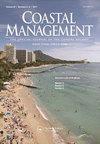Dedication: To Benjamin Labaree, the Sea’s Renaissance Man
IF 1.9
4区 环境科学与生态学
Q4 ENVIRONMENTAL SCIENCES
引用次数: 0
Abstract
This special issue of Coastal Management Journal is dedicated to Professor Benjamin Woods Labaree—one of the Sea’s Renaissance Men. The term “Renaissance” most commonly applies to the 14th century humanistic revival of classical art, architecture, literature, and learning that originated in Italy and over the next several centuries spread throughout Europe.1 When applied to an individual, a Renaissance man or woman, is “a person of broad talents and expertise” (think Michelangelo), in particular, “one straddling both humanist and technological concerns” (think Leonardo da Vinci).2 Such an individual is Professor Labaree. Labaree’s contributions to the maritime field began early, as a graduate student. Someone close to the Professor recounts, he then “debunked a previous theory about how the Greeks rowed their warships to overcome the currents through the Bosporus Straits into the Black Sea to establish trade.” Labaree realized the Greeks would not have used warships for trade and demonstrated using then-contemporary nautical almanac records to establish current speeds that under certain current and wind conditions, the Greeks’ merchant ships could make the passage.3 From 1962, when he published Patriots and Partisans through his and his co-authors’ 1998 treatise America and the sea: a maritime history, Labaree illuminated this country’s interwoven sea connections. In 1974, he became the Frank C. Munson Institute of American Maritime History’s Director where, in 1996, he co-led the National Endowment of the Humanities Summer Institute on America and the Sea. Over these two decades, he received numerous awards, including one from the North American Society for Oceanic History.4 “Renaissance” also connotes “a resurgence of excitement or interest in something.” In the 1970s, the world’s interest and excitement in the ocean and its resources surged. Internationally, nations convened under the United Nations’ auspices to negotiate a law of the sea treaty. At home, the U.S. enacted legislation to manage our fisheries and heavily used coastal zone. Riding this cresting tide, Labaree’s scholarship pivoted to all facets of the nation’s relationship to the sea by founding the Williams College-Mystic Seaport Program in Maritime Studies. At the seaport, he assembled scholars in maritime history, literature, policy, and science. Each semester, lucky students from many undergraduate institutions sat around the table absorbing tales of and lessons from the sea. In 2019, the National Maritime Historical Society awarded Williams-Mystic its Walter Cronkite Award for Excellence in Maritime Education. In bestowing the award, Burchenal Green—the Society’s President–praised the program “as the only undergraduate studies program examining the history, literature, policy and science of the sea, resulting in several thousand informed alumni prepared for societal leadership with a balanced understanding献给本杰明·拉巴里,海上的文艺复兴人
《海岸管理杂志》的这期特刊是献给海洋文艺复兴时期的人物之一Benjamin Woods Labaree教授的。“文艺复兴”一词最常见于14世纪古典艺术、建筑、文学和学术的人文复兴,起源于意大利,在接下来的几个世纪里传播到整个欧洲。1当用于个人时,文艺复兴时期的男性或女性是“具有广泛才能和专业知识的人”(想想米开朗基罗),“一个横跨人文主义和技术问题的人”(想想达)。2这样的人就是Labaree教授。Labaree在海事领域的贡献很早就开始了,当时他还是一名研究生。一位与这位教授关系密切的人回忆道,他随后“揭穿了以前的一种理论,即希腊人是如何驾驶军舰克服流经博斯普鲁斯海峡的水流进入黑海建立贸易的。“Labaree意识到希腊人不会使用军舰进行贸易,并证明使用当时的航海年鉴记录来确定当前速度,即在特定的洋流和风力条件下,希腊人的商船可以通过。3从1962年开始,当他和合著者1998年的论文《美国与海洋:海洋史》发表《爱国者与游击队》时,Labaree阐明了这个国家交织在一起的海洋联系。1974年,他成为弗兰克·C·蒙森美国海事史研究所所长,1996年,他与人共同领导了美国国家人文基金会夏季美国与海洋研究所。在这二十年里,他获得了许多奖项,其中包括北美海洋史学会的一个奖项。4“文艺复兴”也意味着“对某种事物的兴奋或兴趣的复兴”。20世纪70年代,世界对海洋及其资源的兴趣和兴奋激增。在国际上,各国在联合国的主持下召开会议,就海洋法条约进行谈判。在国内,美国制定了立法来管理我们的渔业和大量使用的沿海地区。在这场高潮中,Labaree的学术研究转向了国家与海洋关系的各个方面,创立了威廉姆斯学院神秘海港海事研究项目。在海港,他召集了海事史、文学、政策和科学方面的学者。每学期,来自许多本科院校的幸运学生都会围坐在桌子旁,吸收关于大海的故事和教训。2019年,国家海事历史学会授予Williams Mystic Walter Cronkite海事教育卓越奖。学会主席伯切纳尔·格林在颁奖时称赞该项目“是唯一一个研究海洋历史、文学、政策和科学的本科生研究项目,培养了数千名见多识广的校友,他们对社会领导力有着平衡的理解
本文章由计算机程序翻译,如有差异,请以英文原文为准。
求助全文
约1分钟内获得全文
求助全文
来源期刊

Coastal Management
环境科学-环境科学
CiteScore
6.00
自引率
0.00%
发文量
24
审稿时长
>36 weeks
期刊介绍:
Coastal Management is an international peer-reviewed, applied research journal dedicated to exploring the technical, applied ecological, legal, political, social, and policy issues relating to the use of coastal and ocean resources and environments on a global scale. The journal presents timely information on management tools and techniques as well as recent findings from research and analysis that bear directly on management and policy. Findings must be grounded in the current peer reviewed literature and relevant studies. Articles must contain a clear and relevant management component. Preference is given to studies of interest to an international readership, but case studies are accepted if conclusions are derived from acceptable evaluative methods, reference to comparable cases, and related to peer reviewed studies.
 求助内容:
求助内容: 应助结果提醒方式:
应助结果提醒方式:


